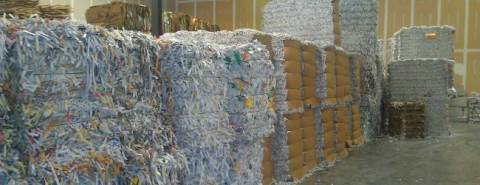Words made pulp: Why I destroy books

Twice a year I take a day off to undo the work I get paid to do. Wrecking what one is devoted to creating sounds batty, and depending on one’s career, it is. But for me, it’s becoming a spiritual practice.
Each spring and fall, my congregation volunteers with a Christian relief, development, and peace-building organization. Early in the morning we pile onto the church bus, clutching our packed lunches as we steer loud, happy kids by their shoulders to their seats. We drive an hour to a warehouse, where our tasks range from making school and health kits for children in refugee camps to knotting comforters and loading pallets of canned meat onto the back of a truck.
Our most common job, however, is ripping apart books for recycling. The organization earns money for each ton of paper it sells to a recycler. The income is used to pay shipping costs for the containers of emergency food aid and relief supplies to go to places like North Korea and Jordan. Before that can happen, the interior pages must be severed from their covers and filleted into sections that the recycler can process.




